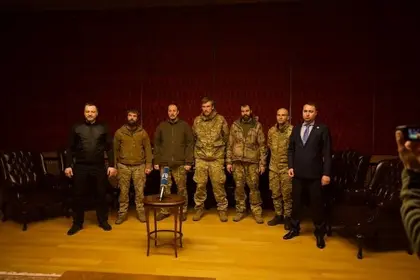Ukraine on Wednesday announced the exchange of a record-high 215 imprisoned soldiers with Russia, including fighters who led the defense of Mariupol’s Azovstal steelworks that became an icon of Ukrainian resistance.
Andriy Yermak, Volodymyr Zelensky’s chief of staff, said that 215 Ukrainian prisoners were exchanged for Viktor Medvedchuk. Of the prisoners returning to Ukraine, 108 served with the Azov Regiment in defense of Mariupol, and 124 were officers. Among the prisoners exchanged, there were also pregnant female soldiers.
Yermak added that five commanders were exchanged for 200 POWs and Viktor Medvedchuk, “Putin’s man in Ukraine.”
Medvedchuk, a citizen of Ukraine, had been captured in the early days of the war as he tried to flee the country. A longtime friend of the Russian president – Putin is his daughter’s godfather – Medvedchuk began his career as a lawyer in the Soviet Union. He was notorious for being the defense lawyer of Ukrainian dissident poet Vasyl Stus. Medvedchuk’s defense, or lack thereof, led to Stus’s incarceration in a Soviet gulag, where he died in 1985.
Since independence, Medvedchuk parlayed his Soviet-era connections and friendship with Putin to become one of Ukraine’s most influential oligarchs. He consistently espoused a pro-Moscow line and founded various pro-Russian parties.
In May 2021, he was indicted for treason and placed under house arrest. In the lead-up to Russia’s full-scale invasion of Ukraine, many analysts felt that Medvedchuk was one of the prime candidates to serve as Putin’s president-puppet if Russia managed to decapitate Ukraine’s government quickly and occupy the country.

N. Korean Troops Massed in Russia to Enter Ukraine War ’Soon’: Pentagon Chief
When the war broke out, he managed to flee Kyiv disguised as a Ukrainian military officer but was captured before he crossed the border.
In his daily address, President Volodymyr Zelensky said five military commanders were taken to Turkey as part of an operation agreed with the Turkish President Recep Tayyip Erdoğan.
The commanders would remain in Turkey “in total security and comfortable conditions” until the end of the war, he added.
The most significant part of the exchange took place in Chernihiv Oblast in the late hours of Sept. 21.
The freed Azovstal defenders include Denys Prokopenko (call sign Redis), Azov Regiment commander; Serhii Volynskyi (call sign Volyna) of the 36th Marine Brigade; Sviatoslav Palamar of the Azov Regiment; as well Denys Shleha of the National Guard; Yevhenii Bova, a pregnant military medic Mariana Mamonova; and Kateryna Polishchuk, better known as “Ptashka,” the bird, who gained notoriety for her appearances on videos singing patriotic songs.
“Among those released are ten foreigners who fought for Ukraine and were threatened with death,” Yermak added. “They are already in Riyadh.”
Together with more than two hundred Ukrainian soldiers, five citizens of Great Britain, two citizens of the USA, and one representative each of Sweden, Croatia, and Morocco were released today.
“Finally, we were able to return another part of the defenders of Mariupol, including the fighters of the Azov regiment. Tonight the exchange took place that we’ve been waiting for,” Maksym Zhorin, former commander of the Azov regiment, wrote on his Telegram channel.
On Sept. 19, Turkish President Tayyip Erdoğan gave an interview with PBS and mentioned the possibility of an exchange.
“In Uzbekistan, I got together with President Putin and had extensive discussions with him. And he is actually showing me that he’s willing to end this as soon as possible. That was my impression because the way things are going is quite problematic; 200 hostages will be exchanged upon an agreement between the parties.”
Although it remains to be seen if this exchange is the first significant gesture toward a peace process, it is undoubtedly a success for Ukrainian President Volodymyr Zelensky.
After the fall of Mariupol in May, Zelensky faced muted criticism for allowing Russia to take the south so easily. When on July 29, the Olenivka prison in Donetsk was blown up with more than 50 Azovstal defenders dead, Zelensky’s decision to have the defender lay down their arms was second-guessed. Many critics have considered the fate of the Azovstal defenders to be a litmus test to judge his decision to order their surrender.
You can also highlight the text and press Ctrl + Enter






